Ward A.W. The Cambridge History of British Foreign Policy. 1783-1919. Volume 3
Подождите немного. Документ загружается.

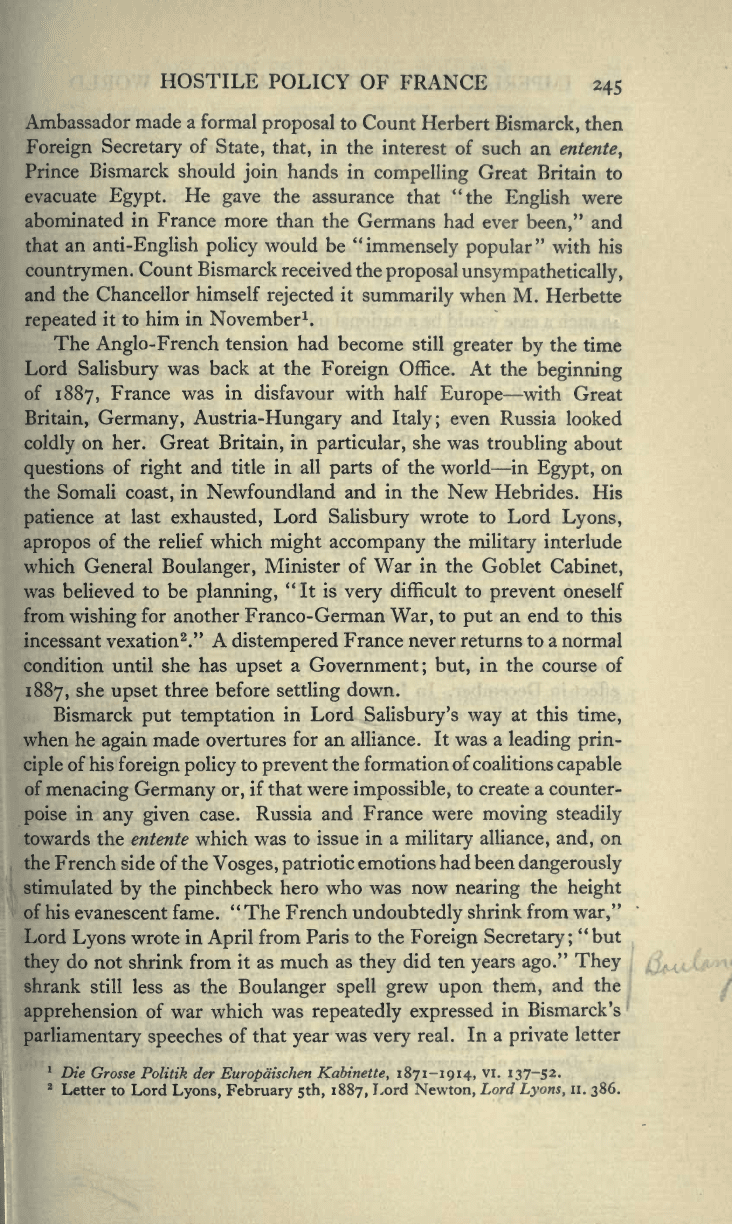
HOSTILE
POLICY
OF
FRANCE
245
Ambassador
made
a
formal
proposal
to
Count
Herbert
Bismarck,
then
Foreign
Secretary
of
State,
that,
in
the
interest of such
an
entente,
Prince
Bismarck
should
join
hands
in
compelling
Great Britain
to
evacuate
Egypt.
He
gave
the
assurance
that "the
English
were
abominated
in
France
more
than
the
Germans
had
ever
been,"
and
that
an
anti-English
policy
would
be
"
immensely popular"
with his
countrymen.
Count Bismarck
received
the
proposal
unsympathetically,
and the
Chancellor himself
rejected
it
summarily
when M.
Herbette
repeated
it
to
him in
November
1
.
The
Anglo-French
tension
had
become still
greater
by
the
time
Lord
Salisbury
was back at
the
Foreign
Office. At
the
beginning
of
1887,
France was in disfavour
with half
Europe
—
with
Great
Britain,
Germany, Austria-Hungary
and
Italy;
even Russia
looked
coldly
on
her.
Great
Britain,
in
particular,
she was
troubling
about
questions
of
right
and title
in all
parts
of the
world
—
in
Egypt,
on
the Somali
coast,
in
Newfoundland
and in
the New
Hebrides.
His
patience
at
last
exhausted,
Lord
Salisbury
wrote to Lord
Lyons,
apropos
of the relief which
might accompany
the
military
interlude
which
General
Boulanger,
Minister
of War in the
Goblet
Cabinet,
was
believed
to be
planning,
"It
is
very
difficult to
prevent
oneself
from
wishing
for another Franco-German
War,
to
put
an
end to this
incessant
vexation
2
." A
distempered
France never returns to a
normal
condition
until she
has
upset
a
Government;
but,
in
the course of
1887,
she
upset
three before
settling
down.
Bismarck
put temptation
in Lord
Salisbury's way
at this
time,
when
he
again
made overtures
for an alliance.
It was a
leading
prin-
ciple
of his
foreign policy
to
prevent
the formation
of
coalitions
capable
of
menacing Germany
or,
if that were
impossible,
to create a counter-
poise
in
any given
case. Russia
and France
were
moving
steadily
towards
the entente which was
to issue
in a
military
alliance,
and,
on
the French
side of
the
Vosges,
patriotic
emotions
had
been
dangerously
stimulated
by
the
pinchbeck
hero
who was now
nearing
the
height
of
his
evanescent fame.
"
The
French
undoubtedly
shrink
from
war,"
Lord
Lyons
wrote
in
April
from
Paris to
the
Foreign
Secretary
;
"
but
they
do not
shrink from it
as much
as
they
did
ten
years
ago."
They
shrank still
less as the
Boulanger
spell grew upon
them,
and the
apprehension
of
war
which was
repeatedly
expressed
in
Bismarck's
parliamentary speeches
of
that
year
was
very
real.
In
a
private
letter
1
Die
Grosse Politik
der
Europciischen
Kabinette,
1871-1914,
VI.
i37
-
52.
2
Letter to Lord
Lyons,
February
5th,
1887,
Lord
Newton,
Lord
Lyons,
11.
386.
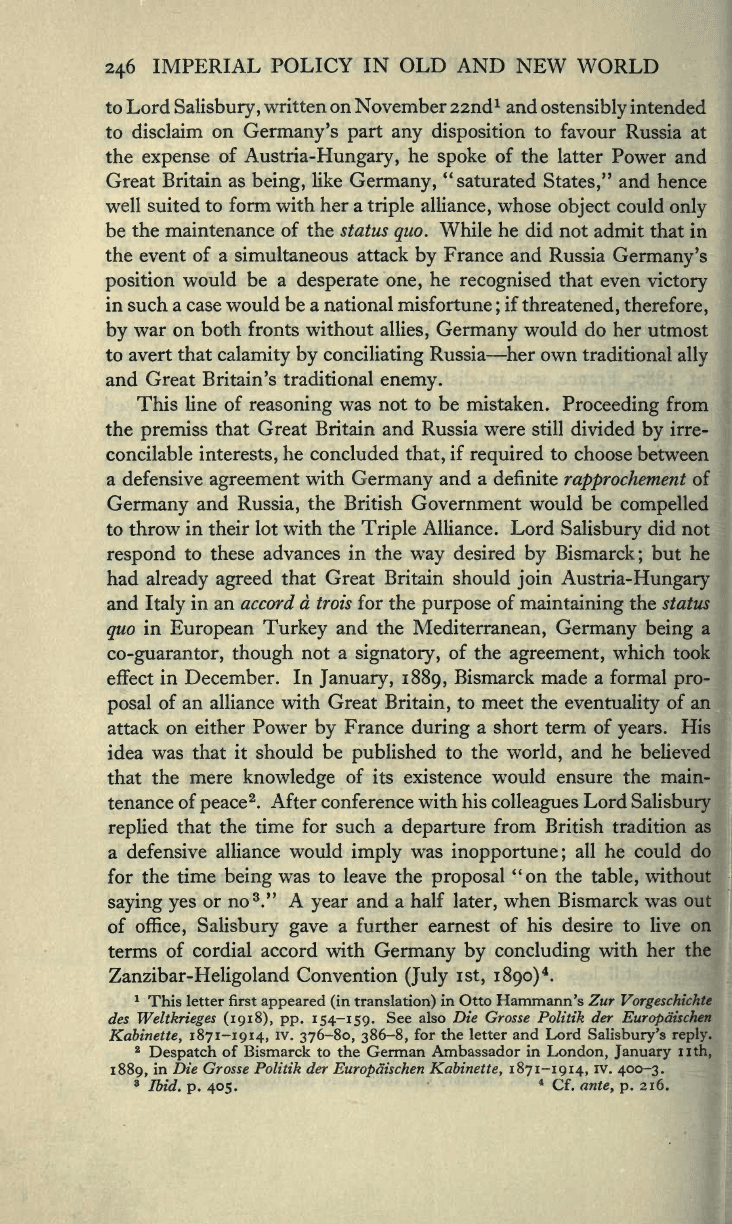
246
IMPERIAL
POLICY
IN OLD
AND
NEW
WORLD
to Lord
Salisbury,
written on
November 22nd
1
and
ostensibly
intended
to disclaim
on
Germany's part any disposition
to
favour
Russia
at
the
expense
of
Austria-Hungary,
he
spoke
of
the
latter
Power and
Great
Britain as
being,
like
Germany,
"
saturated
States,"
and
hence
well
suited
to form
with her a
triple
alliance,
whose
object
could
only
be the
maintenance
of
the
status
quo.
While
he did not
admit that in
the event
of a simultaneous attack
by
France
and
Russia
Germany's
position
would
be
a
desperate
one,
he
recognised
that
even
victory
in such
a case would be
a
national
misfortune
;
if
threatened,
therefore,
by
war on
both fronts without
allies,
Germany
would do her
utmost
to
avert
that
calamity by conciliating
Russia
—
her own
traditional
ally
and Great Britain's
traditional
enemy.
This
line
of
reasoning
was not to be
mistaken.
Proceeding
from
the
premiss
that
Great
Britain and Russia
were still divided
by
irre-
concilable
interests,
he
concluded
that,
if
required
to
choose
between
a defensive
agreement
with
Germany
and a
definite
rapprochement
of
Germany
and
Russia,
the British
Government
would be
compelled
to throw
in
their lot with the
Triple
Alliance. Lord
Salisbury
did
not
respond
to these
advances
in
the
way
desired
by
Bismarck;
but
he
had
already
agreed
that
Great Britain
should
join
Austria-Hungary
and
Italy
in an
accord
a trots
for the
purpose
of
maintaining
the
status
quo
in
European Turkey
and
the
Mediterranean,
Germany being
a
co-guarantor,
though
not
a
signatory,
of
the
agreement,
which
took
effect
in December.
In
January, 1889,
Bismarck made a formal
pro-
posal
of an alliance
with
Great
Britain,
to meet the
eventuality
of
an
attack
on either
Power
by
France
during
a
short term
of
years.
His
idea
was
that
it
should be
published
to the
world,
and he believed
that the
mere
knowledge
of
its
existence
would
ensure
the
main-
tenance
of
peace
2
.
After
conference with
his
colleagues
Lord
Salisbury
replied
that the
time
for
such a
departure
from
British tradition
as
a
defensive
alliance would
imply
was
inopportune;
all
he
could
do
for the
time
being
was
to leave the
proposal
"on the
table,
without
saying
yes
or no
3
." A
year
and a
half
later,
when Bismarck was
out
of
office,
Salisbury
gave
a
further earnest
of
his
desire
to
live
on
terms
of
cordial accord
with
Germany by
concluding
with her
the
Zanzibar-Heligoland
Convention
(July
1st,
1890)
4
.
1
This
letter
first
appeared (in
translation)
in Otto Hammann's
Zur
Vorgeschichte
des
Weltkrieges
(1918),
pp. 154-159.
See
also Die
Grosse Politik der
Europdischen
Kabinette, 1871-1914,
iv.
376-80,
386-8,
for the
letter
and
Lord
Salisbury's
reply.
2
Despatch
of Bismarck to
the German
Ambassador in
London,
January
nth,
1889,
in
Die Grosse Politik
der
Europdischen
Kabinette,
1871-1914,
iv.
400-3.
3
Ibid.
p. 405.
4
Cf.
ante,
p.
216.
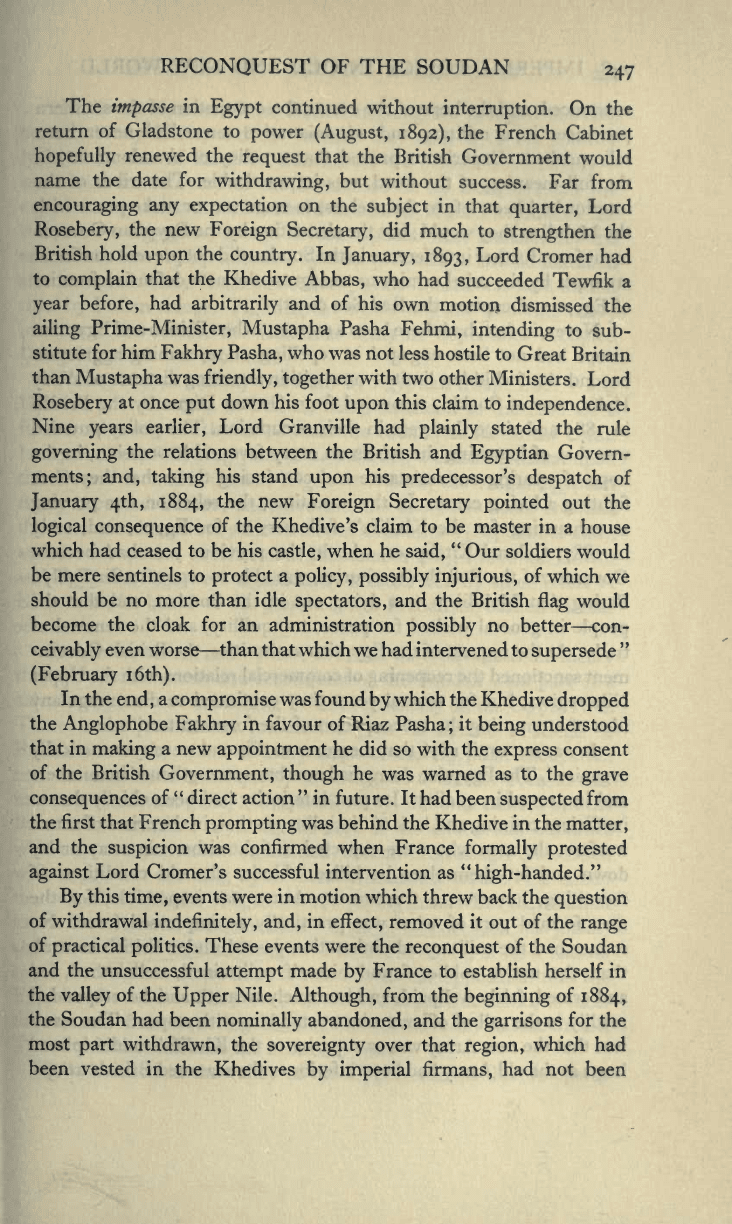
RECONQUEST
OF
THE
SOUDAN
247
The
impasse
in
Egypt
continued
without
interruption.
On
the
return
of
Gladstone to
power
(August,
1892),
the
French
Cabinet
hopefully
renewed
the
request
that the
British
Government
would
name the date
for
withdrawing,
but
without
success.
Far
from
encouraging any
expectation
on
the
subject
in
that
quarter,
Lord
Rosebery,
the new
Foreign
Secretary,
did
much
to
strengthen
the
British hold
upon
the
country.
In
January,
1893,
Lord
Cromer
had
to
complain
that
the
Khedive
Abbas,
who had
succeeded
Tewfik
a
year
before,
had
arbitrarily
and
of his
own
motion
dismissed
the
ailing
Prime-Minister,
Mustapha
Pasha
Fehmi,
intending
to
sub-
stitute for him
Fakhry
Pasha,
who was
not
less
hostile to
Great
Britain
than
Mustapha
was
friendly, together
with
two
other
Ministers.
Lord
Rosebery
at
once
put
down his
foot
upon
this claim
to
independence.
Nine
years
earlier,
Lord
Granville had
plainly
stated
the
rule
governing
the relations between
the British
and
Egyptian
Govern-
ments;
and,
taking
his
stand
upon
his
predecessor's
despatch
of
January 4th,
1884,
the new
Foreign
Secretary pointed
out
the
logical
consequence
of the
Khedive's claim to
be master in
a
house
which had
ceased to be
his
castle,
when he
said,
"
Our
soldiers would
be mere sentinels to
protect
a
policy,
possibly injurious,
of which
we
should
be
no more
than
idle
spectators,
and
the
British
flag
would
become the cloak for an
administration
possibly
no
better
—
con-
ceivably
even
worse
—
than
that
which we had
intervened to
supersede
"
(February 16th).
In
the
end,
a
compromise
was
found
by
which the
Khedive
dropped
the
Anglophobe
Fakhry
in
favour of Riaz Pasha
;
it
being
understood
that in
making
a
new
appointment
he did so
with the
express
consent
of
the British
Government,
though
he
was warned
as
to
the
grave
consequences
of
"
direct action
"
in
future. It had
been
suspected
from
the
first that
French
prompting
was
behind the
Khedive in the
matter,
and
the
suspicion
was
confirmed
when France
formally protested
against
Lord
Cromer's successful
intervention as
"
high-handed."
By
this
time,
events were in
motion which
threw back the
question
of withdrawal
indefinitely,
and,
in
effect,
removed
it
out of the
range
of
practical
politics.
These events
were the
reconquest
of the Soudan
and
the
unsuccessful
attempt
made
by
France to establish herself
in
the
valley
of
the
Upper
Nile.
Although,
from
the
beginning
of
1884,
the
Soudan had
been
nominally
abandoned,
and the
garrisons
for
the
most
part
withdrawn,
the
sovereignty
over
that
region,
which had
been
vested
in
the
Khedives
by imperial
firmans,
had not
been
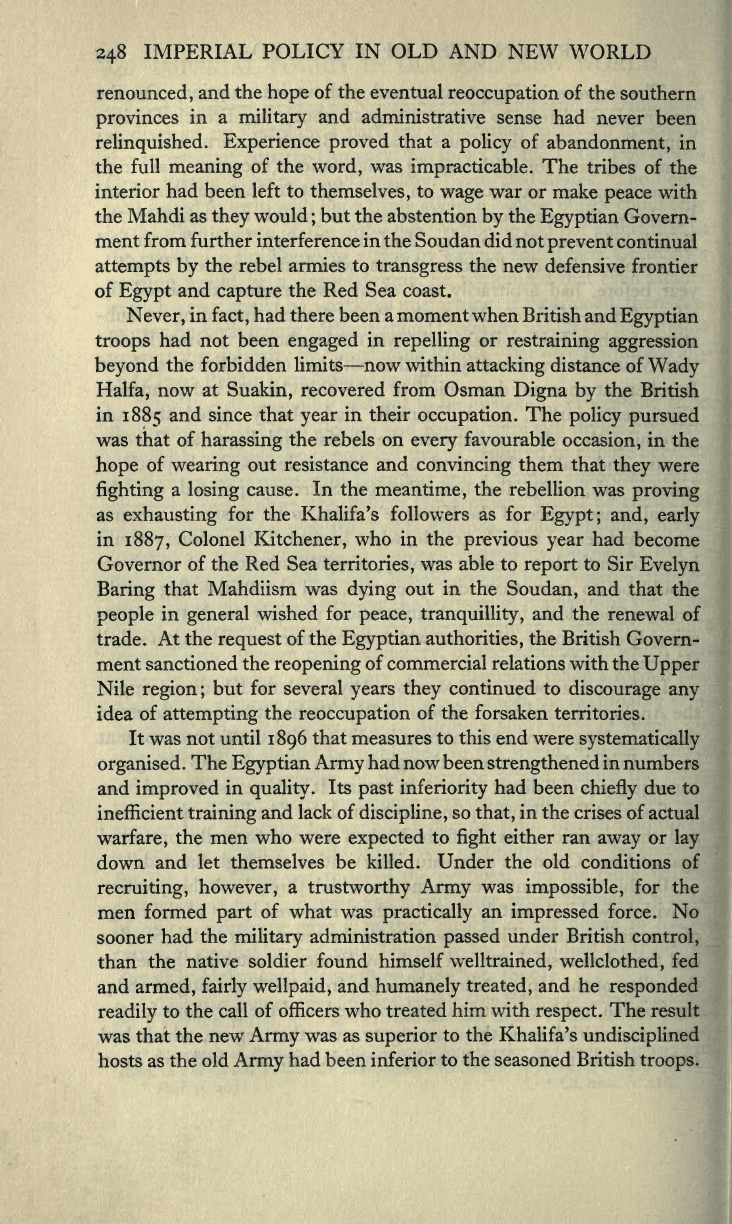
248
IMPERIAL
POLICY IN OLD
AND
NEW WORLD
renounced,
and
the
hope
of the eventual
reoccupation
of the
southern
provinces
in a
military
and
administrative
sense had
never
been
relinquished.
Experience
proved
that
a
policy
of
abandonment,
in
the
full
meaning
of the
word,
was
impracticable.
The
tribes of
the
interior
had
been left to
themselves,
to
wage
war
or
make
peace
with
the
Mahdi as
they
would
;
but
the abstention
by
the
Egyptian
Govern-
ment
from
further interference
in
the Soudan
did
not
prevent
continual
attempts
by
the rebel armies
to
transgress
the
new
defensive
frontier
of
Egypt
and
capture
the Red Sea
coast.
Never,
in
fact,
had there
been
a
momentwhen
British and
Egyptian
troops
had not been
engaged
in
repelling
or
restraining
aggression
beyond
the forbidden limits
—
now within
attacking
distance of
Wady
Haifa,
now at
Suakin,
recovered from Osman
Digna
by
the
British
in
1885
and since
that
year
in their
occupation.
The
policy pursued
was
that of
harassing
the rebels on
every
favourable
occasion,
in
the
hope
of
wearing
out resistance
and
convincing
them
that
they
were
fighting
a
losing
cause. In the
meantime,
the
rebellion
was
proving
as
exhausting
for the
Khalifa's
followers
as for
Egypt;
and,
early
in
1887,
Colonel
Kitchener,
who
in
the
previous
year
had
become
Governor
of the Red Sea
territories,
was able to
report
to Sir
Evelyn
Baring
that Mahdiism was
dying
out in
the
Soudan,
and
that
the
people
in
general
wished for
peace,
tranquillity,
and
the
renewal of
trade.
At the
request
of the
Egyptian
authorities,
the British
Govern-
ment
sanctioned the
reopening
of
commercial relations with
the
Upper
Nile
region;
but
for
several
years they
continued
to
discourage any
idea
of
attempting
the
reoccupation
of the
forsaken
territories.
It was
not until
1896
that
measures
to this
end
were
systematically
organised.
The
Egyptian
Army
had now been
strengthened
in
numbers
and
improved
in
quality.
Its
past
inferiority
had
been
chiefly
due to
inefficient
training
and
lack
of
discipline,
so
that,
in the
crises of
actual
warfare,
the
men who
were
expected
to
fight
either ran
away
or
lay
down
and let themselves be
killed. Under the old
conditions of
recruiting,
however,
a
trustworthy
Army
was
impossible,
for
the
men
formed
part
of what
was
practically
an
impressed
force.
No
sooner
had the
military
administration
passed
under British
control,
than
the
native
soldier
found
himself
welltrained,
wellclothed,
fed
and
armed,
fairly
wellpaid,
and
humanely
treated,
and
he
responded
readily
to the
call
of officers
who
treated
him with
respect.
The result
was
that the
new
Army
was as
superior
to the
Khalifa's
undisciplined
hosts
as the
old
Army
had been inferior
to the seasoned British
troops.
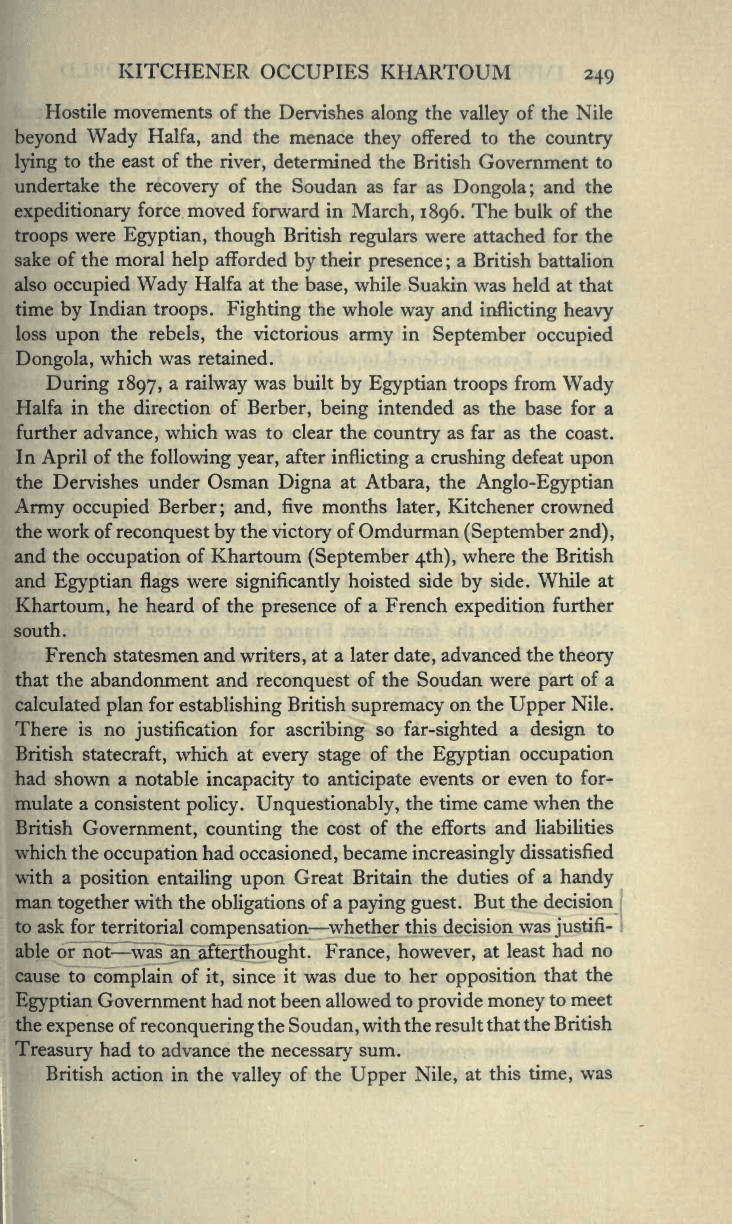
KITCHENER
OCCUPIES
KHARTOUM
249
Hostile
movements
of
the
Dervishes
along
the
valley
of the Nile
beyond
Wady
Haifa,
and
the
menace
they
offered
to
the
country
lying
to the east of
the
river,
determined
the British
Government
to
undertake
the
recovery
of
the
Soudan as
far as
Dongola;
and the
expeditionary
force
moved
forward in
March,
1896.
The
bulk
of the
troops
were
Egyptian,
though
British
regulars
were attached
for the
sake
of
the
moral
help
afforded
by
their
presence
;
a
British battalion
also
occupied Wady
Haifa
at
the
base,
while
Suakin was
held at
that
time
by
Indian
troops.
Fighting
the whole
way
and
inflicting heavy
loss
upon
the
rebels,
the
victorious
army
in
September
occupied
Dongola,
which was retained.
During 1897,
a
railway
was
built
by
Egyptian troops
from
Wady
Haifa
in the direction
of
Berber,
being
intended
as
the base for a
further
advance,
which was
to clear the
country
as far as
the coast.
In
April
of
the
following year,
after
inflicting
a
crushing
defeat
upon
the Dervishes under Osman
Digna
at
Atbara,
the
Anglo-Egyptian
Army
occupied
Berber;
and,
five months
later,
Kitchener crowned
the work of
reconquest
by
the
victory
of Omdurman
(September
2nd),
and
the
occupation
of
Khartoum
(September
4th),
where
the
British
and
Egyptian flags
were
significantly
hoisted side
by
side. While
at
Khartoum,
he
heard of the
presence
of
a French
expedition
further
south.
French statesmen and
writers,
at
a
later
date,
advanced
the
theory
that
the abandonment and
reconquest
of
the
Soudan were
part
of
a
calculated
plan
for
establishing
British
supremacy
on the
Upper
Nile.
There is no
justification
for
ascribing
so
far-sighted
a
design
to
British
statecraft,
which at
every
stage
of
the
Egyptian
occupation
had
shown a
notable
incapacity
to
anticipate
events
or even
to for-
mulate a
consistent
policy.
Unquestionably,
the
time
came when the
British
Government,
counting
the cost of the efforts
and
liabilities
which
the
occupation
had
occasioned,
became
increasingly
dissatisfied
with a
position
entailing upon
Great Britain the
duties of
a
handy
man
together
with
the
obligations
of a
paying guest.
But the decision
to ask
for
territorial
compensation
—
whether
this decision
was
justifi-
able or
not
—
was an
afterthought.
France,
however,
at
least
had no
cause
to
complain
of
it,
since
it
was
due to her
opposition
that
the
Egyptian
Government had
not
been
allowed
to
provide
money
to
meet
the
expense
of
reconquering
the
Soudan,
with
the result
that
the
British
Treasury
had
to
advance the
necessary
sum.
British
action in
the
valley
of the
Upper
Nile,
at
this
time,
was
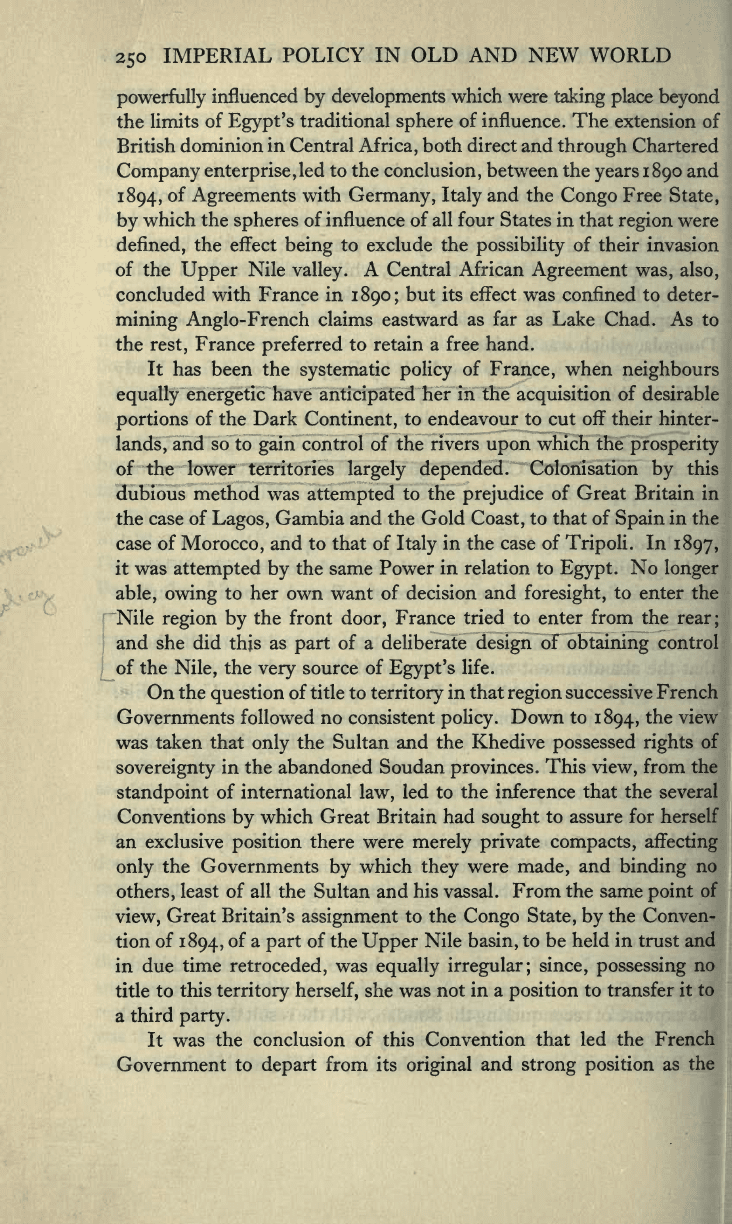
250
IMPERIAL
POLICY
IN OLD AND NEW
WORLD
powerfully
influenced
by
developments
which
were
taking place
beyond
the limits
of
Egypt's
traditional
sphere
of
influence. The
extension of
British
dominion
in
Central
Africa,
both
direct and
through
Chartered
Company
enterprise,
led
to the
conclusion,
between the
years
1890
and
1894,
of
Agreements
with
Germany,
Italy
and
the
Congo
Free
State,
by
which the
spheres
of influence of
all
four States in that
region
were
defined,
the effect
being
to
exclude
the
possibility
of
their invasion
of
the
Upper
Nile
valley.
A Central
African
Agreement
was,
also,
concluded
with
France
in 1
890
;
but
its
effect was
confined
to deter-
mining Anglo-French
claims eastward
as far as
Lake Chad.
As
to
the
rest,
France
preferred
to retain a free
hand.
It has
been the
systematic
policy
of
France,
when
neighbours
equally energetic
have
anticipated
her
in the
acquisition
of
desirable
portions
of
the
Dark
Continent,
to endeavour to cut
off their
hinter-
lands,
and
so
to
gain
control of the
rivers
upon
which the
prosperity
of the lower territories
largely
depended.
Colonisation
by
this
dubious method
was
attempted
to the
prejudice
of Great
Britain in
the
case
of
Lagos,
Gambia and
the
Gold
Coast,
to that
of
Spain
in
the
case of
Morocco,
and to
that
of
Italy
in the case of
Tripoli.
In
1897,
it was
attempted by
the
same Power
in relation to
Egypt.
No
longer
able,
owing
to
her own want of
decision
and
foresight,
to enter the
Nile
region
by
the front
door,
France
tried to enter
from the
rear
;
and she did
this
as
part
of a deliberate
design
of
obtaining
control
of the
Nile,
the
very
source of
Egypt's
life.
On the
question
of
title
to
territory
in that
region
successive French
Governments followed no
consistent
policy.
Down
to
1894,
the view
was taken that
only
the Sultan
and the Khedive
possessed
rights
of
sovereignty
in the
abandoned Soudan
provinces.
This
view,
from the
standpoint
of international
law,
led
to the inference
that
the several
Conventions
by
which Great
Britain had
sought
to
assure
for herself
an exclusive
position
there were
merely
private compacts,
affecting
only
the
Governments
by
which
they
were
made,
and
binding
no
others,
least of all the Sultan
and
his vassal.
From the
same
point
of
view,
Great Britain's
assignment
to the
Congo
State,
by
the Conven-
tion
of
1894,
of a
part
of the
Upper
Nile
basin,
to be held in trust and
in
due time
retroceded,
was
equally
irregular;
since,
possessing
no
title
to
this
territory
herself,
she was
not
in a
position
to transfer
it
to
a third
party.
It was the
conclusion
of
this Convention
that led the French
Government
to
depart
from its
original
and
strong
position
as
the
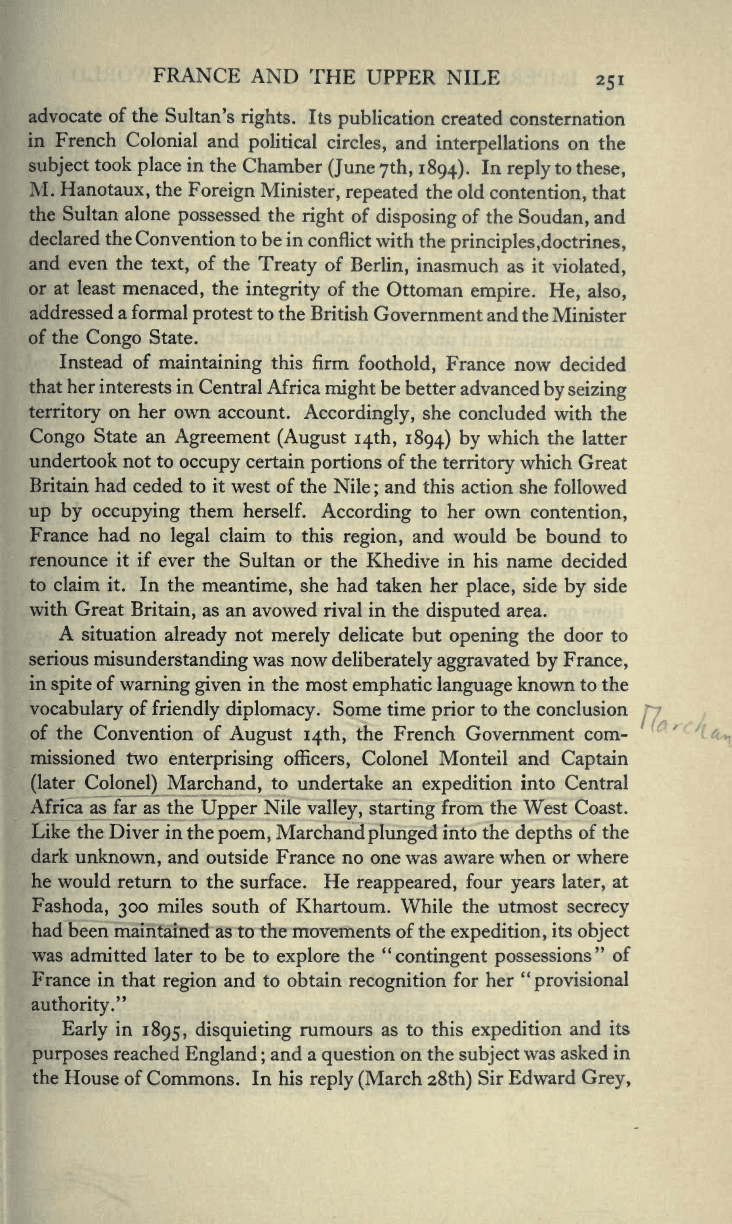
FRANCE
AND
THE
UPPER
NILE
251
advocate
of the
Sultan's
rights.
Its
publication
created consternation
in
French
Colonial
and
political circles,
and
interpellations
on the
subject
took
place
in
the
Chamber
(June
7th,
1894).
In
reply
to
these,
M.
Hanotaux,
the
Foreign
Minister,
repeated
the old
contention,
that
the
Sultan
alone
possessed
the
right
of
disposing
of
the
Soudan,
and
declared
the
Convention to
be
in
conflict
with
the
principles,doctrines,
and
even the
text,
of
the
Treaty
of
Berlin,
inasmuch as it
violated,
or
at least
menaced,
the
integrity
of
the
Ottoman
empire.
He,
also,
addressed
a
formal
protest
to
the
British
Government and
the
Minister
of
the
Congo
State.
Instead of
maintaining
this
firm
foothold,
France now
decided
that
her interests in
Central
Africa
might
be
better
advanced
by
seizing
territory
on her
own account.
Accordingly,
she
concluded with
the
Congo
State an
Agreement
(August
14th,
1894) by
which
the
latter
undertook
not to
occupy
certain
portions
of
the
territory
which
Great
Britain had
ceded to it
west of
the Nile
;
and
this action
she
followed
up
by
occupying
them
herself.
According
to
her own
contention,
France had
no
legal
claim
to this
region,
and
would be bound
to
renounce it if
ever the
Sultan or
the
Khedive in
his
name decided
to claim it.
In
the
meantime,
she
had
taken her
place,
side
by
side
with Great
Britain,
as an
avowed
rival
in
the
disputed
area.
A
situation
already
not
merely
delicate but
opening
the door to
serious
misunderstanding
was now
deliberately aggravated by
France,
in
spite
of
warning given
in
the most
emphatic
language
known to the
vocabulary
of
friendly
diplomacy.
Some
time
prior
to the
conclusion
jy
of
the
Convention
of
August
14th,
the French Government
com-
missioned
two
enterprising
officers,
Colonel
Monteil
and
Captain
(later
Colonel)
Marchand,
to
undertake
an
expedition
into Central
Africa as far
as
the
Upper
Nile
valley, starting
from the
West Coast.
Like
the
Diver in
the
poem,
Marchand
plunged
into the
depths
of
the
dark
unknown,
and
outside France no
one
was
aware when
or where
he would
return to
the surface. He
reappeared,
four
years
later,
at
Fashoda,
300
miles
south
of
Khartoum. While the
utmost
secrecy
had
been
maintained as
to
the movements of
the
expedition,
its
object
was
admitted
later to be to
explore
the
"contingent
possessions"
of
France in
that
region
and to obtain
recognition
for
her
"provisional
authority."
Early
in
1895,
disquieting
rumours
as to this
expedition
and
its
purposes
reached
England
;
and a
question
on the
subject
was asked
in
the
House of
Commons.
In his
reply
(March
28th)
Sir
Edward
Grey,
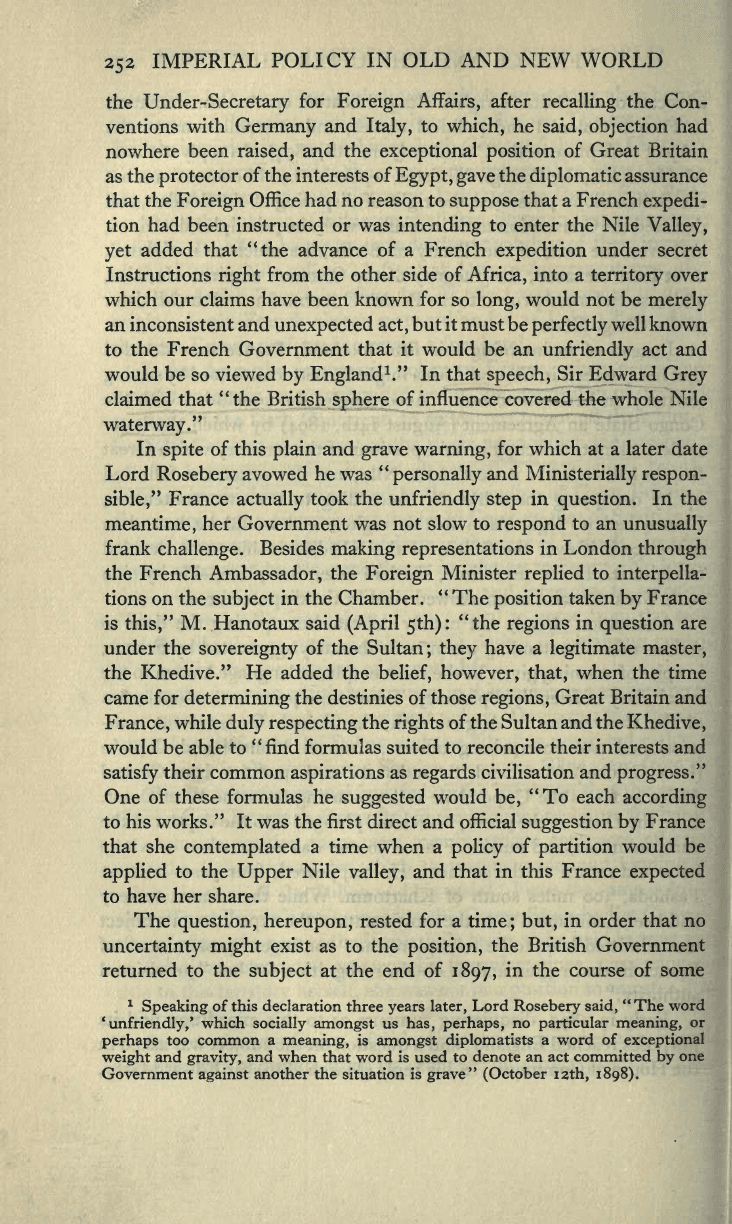
252
IMPERIAL
POLICY
IN OLD
AND
NEW
WORLD
the
Under-Secretary
for
Foreign
Affairs,
after
recalling
the
Con-
ventions
with
Germany
and
Italy,
to
which,
he
said,
objection
had
nowhere
been
raised,
and
the
exceptional
position
of Great
Britain
as
the
protector
of
the interests
of
Egypt, gave
the
diplomatic
assurance
that
the
Foreign
Office
had no
reason
to
suppose
that
a French
expedi-
tion
had been instructed
or was
intending
to
enter the Nile
Valley,
yet
added
that "the advance
of a
French
expedition
under
secret
Instructions
right
from the
other side of
Africa,
into a
territory
over
which our claims have been known for so
long,
would
not be
merely
an
inconsistent and
unexpected
act,
but
it
must be
perfectly
well
known
to
the French Government
that it
would
be an
unfriendly
act and
would be so viewed
by England
1
."
In that
speech,
Sir Edward
Grey
claimed
that
"the
British
sphere
of
influence covered the whole
Nile
waterway."
In
spite
of this
plain
and
grave
warning,
for which at a later date
Lord
Rosebery
avowed
he was
"personally
and
Ministerially
respon-
sible,"
France
actually
took the
unfriendly
step
in
question.
In
the
meantime,
her Government
was not slow to
respond
to an
unusually
frank
challenge.
Besides
making
representations
in
London
through
the French
Ambassador,
the
Foreign
Minister
replied
to
interpella-
tions on the
subject
in
the
Chamber.
"
The
position
taken
by
France
is
this,"
M. Hanotaux said
(April
5th):
"the
regions
in
question
are
under the
sovereignty
of the Sultan
;
they
have
a
legitimate
master,
the
Khedive."
He
added the
belief, however, that,
when the time
came
for
determining
the destinies of those
regions,
Great Britain
and
France,
while
duly respecting
the
rights
of the
Sultan and
the
Khedive,
would be able to
"find
formulas suited
to reconcile their interests
and
satisfy
their common
aspirations
as
regards
civilisation and
progress."
One of
these
formulas he
suggested
would
be,
"To
each
according
to his
works."
It was the first
direct
and official
suggestion
by
France
that
she
contemplated
a
time when
a
policy
of
partition
would
be
applied
to the
Upper
Nile
valley,
and
that
in this
France
expected
to
have her
share.
The
question,
hereupon,
rested
for
a
time;
but,
in
order
that
no
uncertainty might
exist as to the
position,
the
British Government
returned
to the
subject
at
the
end of
1897,
in
the course
of
some
1
Speaking
of
this declaration
three
years
later,
Lord
Rosebery
said,
"The
word
'unfriendly,'
which
socially amongst
us
has,
perhaps,
no
particular
meaning,
or
perhaps
too common
a
meaning,
is
amongst
diplomatists
a word of
exceptional
weight
and
gravity,
and
when
that word
is
used
to
denote an act committed
by
one
Government
against
another
the
situation
is
grave"
(October 12th, 1898).
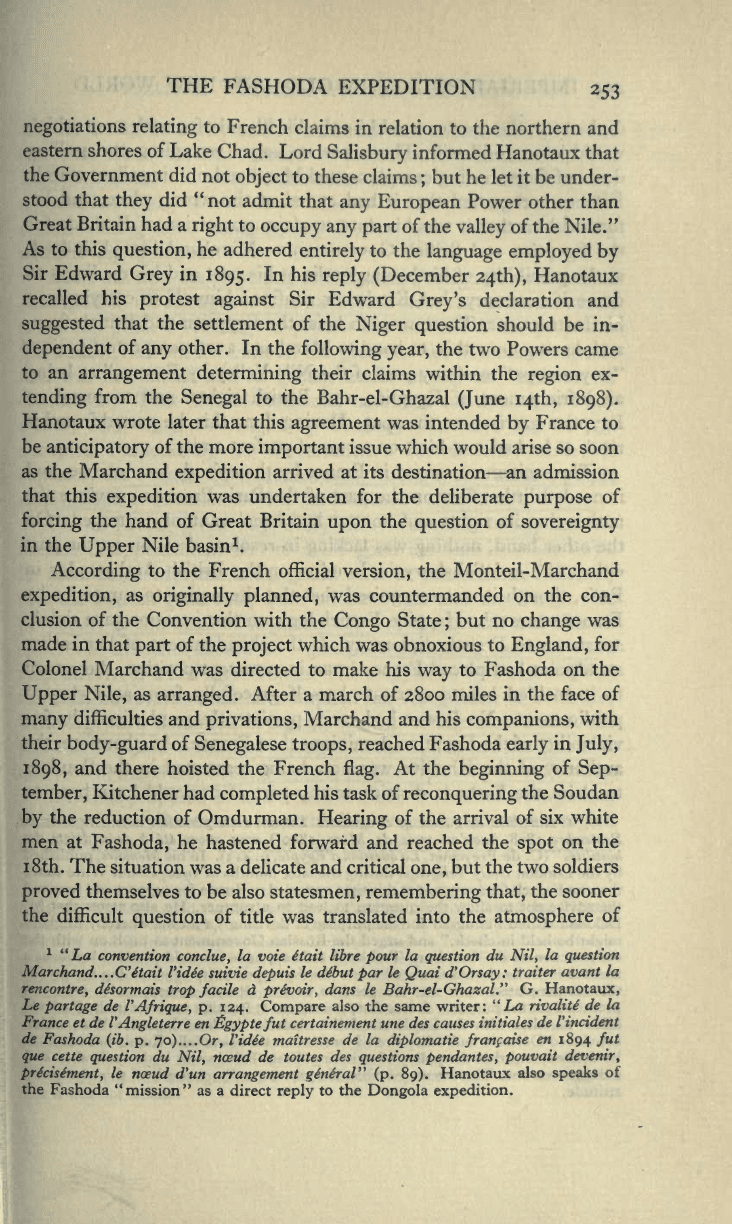
THE
FASHODA
EXPEDITION
253
negotiations
relating
to
French
claims
in relation to the northern and
eastern
shores
of
Lake
Chad.
Lord
Salisbury
informed Hanotaux
that
the Government
did
not
object
to
these
claims
;
but
he
let it be under-
stood that
they
did
"not
admit
that
any
European
Power other
than
Great Britain had
a
right
to
occupy any part
of
the
valley
of the
Nile."
As
to
this
question,
he
adhered
entirely
to
the
language employed
by
Sir Edward
Grey
in
1895.
In
nis re
Pty (December
24th),
Hanotaux
recalled his
protest
against
Sir
Edward
Grey's
declaration and
suggested
that
the
settlement
of
the
Niger
question
should be in-
dependent
of
any
other. In
the
following year,
the two Powers came
to an
arrangement
determining
their
claims
within the
region
ex-
tending
from
the
Senegal
to the
Bahr-el-Ghazal
(June 14th,
1898).
Hanotaux
wrote later that
this
agreement
was intended
by
France to
be
anticipatory
of
the
more
important
issue which
would
arise so soon
as
the Marchand
expedition
arrived at its
destination
—
an admission
that
this
expedition
was undertaken
for the deliberate
purpose
of
forcing
the hand
of
Great Britain
upon
the
question
of
sovereignty
in
the
Upper
Nile basin
1
.
According
to the
French official
version,
the
Monteil-Marchand
expedition,
as
originally planned,
was countermanded on
the con-
clusion
of the
Convention
with the
Congo
State
;
but
no
change
was
made in
that
part
of the
project
which was obnoxious
to
England,
for
Colonel
Marchand
was
directed
to
make his
way
to Fashoda
on the
Upper
Nile,
as
arranged.
After
a march
of
2800
miles in
the face
of
many
difficulties and
privations,
Marchand
and
his
companions,
with
their
body-guard
of
Senegalese troops,
reached Fashoda
early
in
July,
1898,
and
there
hoisted
the
French
flag.
At
the
beginning
of
Sep-
tember,
Kitchener had
completed
his task of
reconquering
the
Soudan
by
the
reduction of Omdurman.
Hearing
of the
arrival
of
six white
men at
Fashoda,
he
hastened
forward and
reached
the
spot
on
the
1
8th.
The
situation was a
delicate
and critical
one,
but the
two
soldiers
proved
themselves
to
be
also
statesmen,
remembering
that,
the
sooner
the
difficult
question
of title was translated into
the
atmosphere
of
1
"
La
convention
conclue,
la vote
etait libre
pour
la
question
du
Nil,
la
question
Marchand.. . .C
etait Videe
suivie
depuis
le dibut
par
le
Quai d'Orsay:
traiter
avant
la
rencontre,
desormais tr
op facile
a
prevoir,
dans le
Bahr-el-Ghazal."
G.
Hanotaux,
Le
partage
de
VAfrique,
p. 124.
Compare
also
the same
writer:
"La
rivaliti
de la
France
et
de V
Angleterre
en
E\gyptefut
certainenient une des causes
initiales
de
Vincident
de
Fashoda
(ib.
p. 70).. ..Or,
Vidie maitresse de
la
diplomatic
frangaise
en
1894
fut
que
cette
question
du
Nil,
nozud de
toutes
des
questions
pendantes,
pouvait
devenir,
pricis&ment,
le
noeud d'un
arrangement general" (p. 89).
Hanotaux
also
speaks
of
the
Fashoda
"mission" as a
direct
reply
to
the
Dongola
expedition.
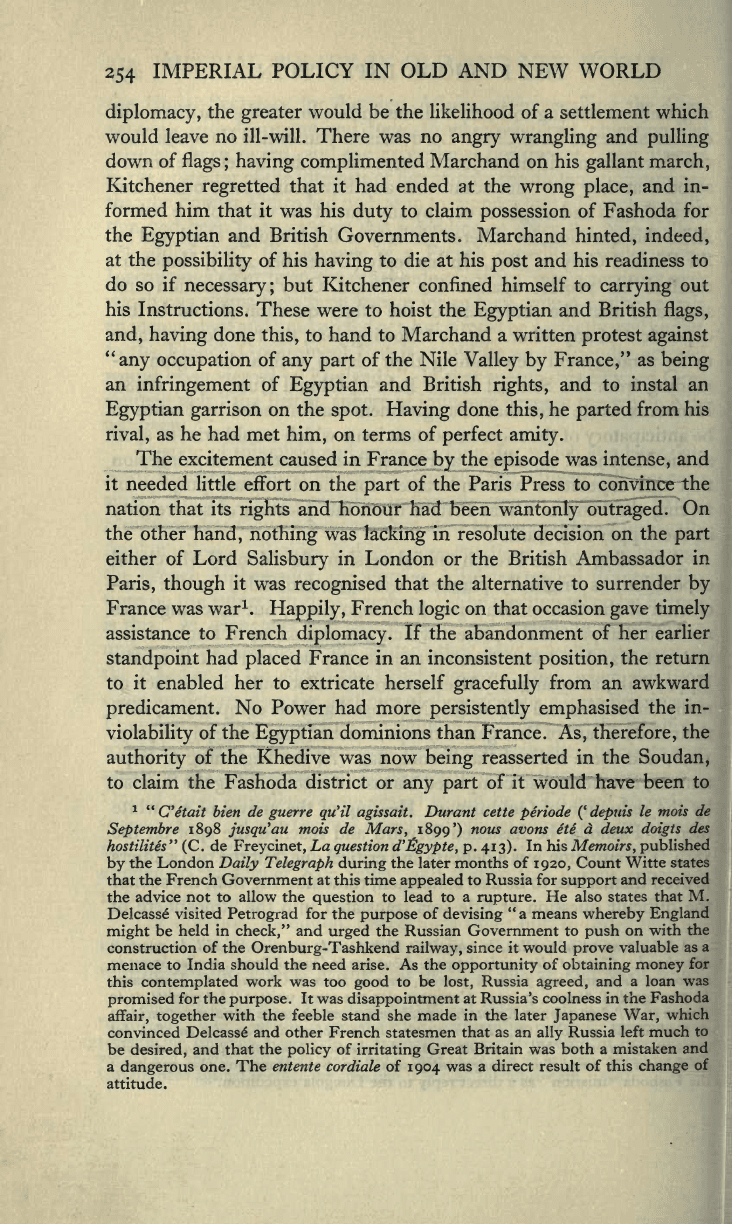
254
IMPERIAL
POLICY
IN
OLD AND NEW WORLD
diplomacy,
the
greater
would
be the likelihood of a
settlement
which
would leave
no
ill-will.
There
was
no
angry wrangling
and
pulling
down
of
flags;
having
complimented
Marchand on his
gallant
march,
Kitchener
regretted
that
it
had ended
at
the
wrong
place,
and
in-
formed
him
that it
was his
duty
to claim
possession
of
Fashoda for
the
Egyptian
and British
Governments. Marchand
hinted,
indeed,
at the
possibility
of his
having
to die
at his
post
and his readiness
to
do so if
necessary;
but
Kitchener confined himself to
carrying
out
his
Instructions. These
were
to hoist
the
Egyptian
and British
flags,
and,
having
done
this,
to hand to Marchand a written
protest
against
"any occupation
of
any
part
of the Nile
Valley
by
France,"
as
being
an
infringement
of
Egyptian
and British
rights,
and
to instal an
Egyptian
garrison
on the
spot. Having
done
this,
he
parted
from
his
rival,
as
he
had
met
him,
on terms of
perfect
amity.
The
excitement caused
in
France
by
the
episode
was
intense,
and
it
needed
little effort on the
part
of
the
Paris
Press to
convince
the
nation that its
rights
and honour had been
wantonly outraged.
On
the other
hand,
nothing
was
lacking
in
resolute decision
on the
part
either of Lord
Salisbury
in London or the British
Ambassador
in
Paris,
though
it
was
recognised
that the
alternative
to surrender
by
France
was
war
1
.
Happily,
French
logic
on that occasion
gave
timely
assistance
to
French
diplomacy.
If
the abandonment
of her earlier
standpoint
had
placed
France
in an
inconsistent
position,
the return
to it
enabled her to extricate herself
gracefully
from an awkward
predicament.
No
Power
had
more
persistently
emphasised
the
in-
violability
of the
Egyptian
dominions than France.
As,
therefore,
the
authority
of the Khedive
was
now
being
reasserted
in the
Soudan,
to claim the Fashoda district or
any part
of
it
would
have been
to
1
"
C'etait bien
de
guerre quHl
agissait.
Durant
cette
periode ('
depuis
le mois
de
Septembre 1898 jusqu'au
mois de
Mars,
1899')
nous avons
ete
a deux
doigts
des
hostilites
"
(C.
de
Freycinet,
La
question d'£gypte,
p. 413).
In his
Memoirs,
published
by
the
London
Daily
Telegraph
during
the later months
of
1920,
Count
Witte
states
that
the
French
Government at this time
appealed
to Russia
for
support
and received
the
advice
not
to allow
the
question
to lead to
a
rupture.
He also
states
that
M.
Delcass£
visited
Petrograd
for
the
purpose
of
devising
"a means
whereby
England
might
be
held in
check,"
and
urged
the Russian
Government to
push
on with
the
construction
of
the
Orenburg-Tashkend railway,
since
it would
prove
valuable
as
a
menace
to
India should
the need arise. As the
opportunity
of
obtaining money
for
this
contemplated
work was
too
good
to be
lost,
Russia
agreed,
and
a
loan
was
promised
for
the
purpose.
It
was
disappointment
at
Russia's coolness in the
Fashoda
affair, together
with
the
feeble
stand
she made
in the later
Japanese
War,
which
convinced
Delcass£
and
other French statesmen
that
as an
ally
Russia
left
much
to
be
desired,
and that
the
policy
of
irritating
Great
Britain was
both
a mistaken
and
a
dangerous
one.
The entente
cordiale of
1904
was
a
direct
result
of this
change
of
attitude.
